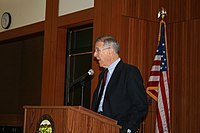Pete Stark
Fortney Hillman "Pete" Stark Jr. (November 11, 1931 – January 24, 2020) was an American businessman and politician who was a member of the United States House of Representatives from 1973 to 2013.
A Democrat from California,[2] Stark's district—California's 13th congressional district during his last two decades in Congress—was in southwestern Alameda County and included Alameda, Union City, Hayward, Newark, San Leandro, San Lorenzo, and Fremont (his residence during the early part of his tenure), as well as parts of Oakland and Pleasanton.
After leaving the Air Force, Stark attended the Haas School of Business at the University of California, Berkeley, and received his MBA in 1960.
[9] In 1972, at the age of 41, Stark ran in the Democratic primary against 14-term incumbent U.S. Representative and octogenarian George Paul Miller of Alameda in what was then the 8th district.
Because of California's new nonpartisan blanket primary, which allows the general election to be contested by the two highest vote-getters in the primary regardless of party affiliation,[14] his opponent in the general election was Dublin city councilman Eric Swalwell, a fellow Democrat who was almost half a century Stark’s junior.
[17][18] Stark voted both times against the Emergency Economic Stabilization Act of 2008, which created the Troubled Asset Relief Program.
[21][22] He said he was " one of the few members on my side of the aisle to vote against the TARP bill both times....because I believed that it rewarded the very entities that built the financial house of cards that has come crashing down.
[25] The bill proposed using the revenue raised to invest in climate change adaptation, child care programs, and a Global Health Trust Fund to combat diseases, such as HIV/AIDS, malaria, and tuberculosis.
[26] With John Conyers, in April 2006, Stark brought an action against President Bush and others alleging violations of the United States Constitution in the passing of the Deficit Reduction Act of 2005, which cut Medicaid payments.
[34] Over the years, Stark worked with others, notably his Republican counterpart, Bill Gradison (Ohio), and Representatives Henry Waxman, George Miller, and Senator Ted Kennedy, to advance health improvement ideas.
[35] In 2010, Stark's seniority would have placed him in line for the chairmanship of the Ways and Means committee, when Charlie Rangel was forced by ethics charges to step down.
[36]In January 2003, Stark supported a reinstatement of the draft, partly in protest against the call to war but also saying, "If we're going to have these escapades, we should not do it on the backs of poor people and minorities.
"[37][38] In October 2004, he was one of only two members of Congress to vote in favor of the Universal National Service Act of 2003 (HR 163), a bill proposing resumption of the military draft.
In a statement posted on his website he explained, "Despite my utmost respect for my colleagues who crafted this bill, I can't in good conscience vote to continue this war.
I look forward to working with the Secular Coalition to stop the promotion of narrow religious beliefs in science, marriage contracts, the military and the provision of social service."
The resolution states, "Charles Darwin is a worthy symbol of scientific advancement ... and around which to build a global celebration of science and humanity.
'"[50] In a 2001 Ways and Means Subcommittee on Health hearing on abstinence promotion, he referred to Congressman J. C. Watts of Oklahoma as "the current Republican Conference Chairman, whose children were all born out of wedlock.
On August 27, 2009, Stark suggested that his moderate Democratic colleagues were "brain dead" for proposing changes to the America's Affordable Health Choices Act of 2009 being considered by Congress.
During a conference call, Stark said that they: ... just want to cause trouble ... they're for the most part, I hate to say, brain dead, but they're just looking to raise money from insurance companies and promote a right-wing agenda that is not really very useful in this whole process.
[53][54]During a town hall meeting in September 2009, a constituent who opposed President Barack Obama's health care plan told Stark, "Mr.
On October 18, 2007, Stark made the following comments on the House floor during a debate with Congressman Joe Barton of Texas: "You don't have money to fund the war or children...but you're going to spend it to blow up innocent people if we can get enough kids to grow old enough for you to send to Iraq to get their heads blown off for the president's amusement.
But I respect neither the Commander-in-Chief who keeps them in harms [sic] way nor the chickenhawks in Congress who vote to deny children health care”.
[62][63]Stark bought a $1.7 million waterfront home in Harwood, Anne Arundel County, Maryland, in 1988, and spent most of his time there in the latter part of his congressional tenure.
[64][65] The United States House Committee on Ethics began an investigation and in January 2010, it voted unanimously to clear Stark of any wrongdoing.
[1][69] His successor in Congress, Eric Swalwell, issued a statement:Pete Stark gave decades of public service to East Bay residents as a voice in Congress for working people... His knowledge of policy, particularly regarding health care, and his opposition to unnecessary wars demonstrated his deep care for his constituents.
